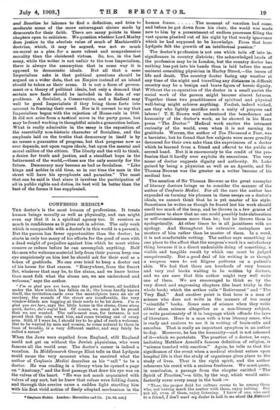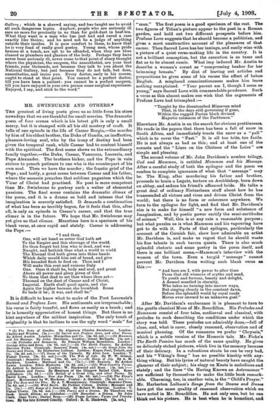CONFESSIO MEDICI.*
THE doctor's is the most human of professions. It treats human beings morally as well as physically, and one might
even say that it is a spiritual agency too. It receives as much in confidences as it gives out in advice. The only work which is comparable with a doctor's in this world is a parson's.
But the parson has fewer opportunities than the doctor; he starts in only too many of his efforts for the good of men with a dead weight of prejudice against him which he must either remove or reduce before he can accomplish anything. Half the men who welcome material help from their parson keep one eye suspiciously on him lest he should ask for their soul as a token of gratitude. No one ever tried to keep a doctor out of his house for that reason. "Everywhere, from the Smart Set, whatever that may be, to the slums, and we know better than most folk what the slums are, we are understood and welcome," says the author.
"I'm so glad you are here, says the grand house, all huddled under the blow which has fallen on it; the house hardly knows itself, the invitation-cards over the mantelpiece have an air of mockery, the sounds of the street are insufferable, the very window-blinds are tugging at their cords to be let down. I'm so glad you are here, says the little house in the slums, Come along quick, doctor, she's awful bad. Of course, we must not be proud that we are wanted. The cat's-meat man, for instance, is not proud that the cats want him, and come twisting out of every area. Still, if I were he, I should try to be glad of such a welcome. But to be wanted by men and women, to come natural to them in time of trouble, is a very different matter, and may fairly be called a career."
When the Jews were expelled from England, still England could not get on without the Jewish physicians, who were famous all the world over. The doctor's career is indeed a vocation. In lifiddlemarch George Eliot tells us that Lydgate could name the very moment when he received what the author of Ccmfessio Medici describes as his " call " to be a
doctor. He was reading in a, library when he opened a page on "Anatomy," and the first passage that drew his eye was on
the valves of the heart. "He was not much acquainted with valves of any sort, but he knew that valvae were folding doors, and through this crevice came a sadden light startling him with his first vivid notion of finely adapted mechanism in the
• Cenfessio Medici. London; Macmillan and Co. pa. 8d. net.]
human frame The moment of vocation had come,
and before he got down from his chair, the world was made new to him by a presentment of endless processes filling the vast spaces planked out of his sight by that wordy ignorance which he had supposed to be knowledge. From that hour Lydgate felt the growth of an intellectual passion."
The doctor's profession is not one which tails off into in- significance in country districts; the acknowledged heads of the profession may be in Lon,don, but the country doctor has nothing less put into his hands than is laid before the most eminent consulting physician in Harley Street,—the issues of life and death. The country doctor facing any weather at any time of the night and travelling any distances in difficult country may be a benign and brave figure of heroic dignity. Without the co-operation of the doctor in a small parish the social work of the parson might become almost fatuous. Together these two practitioners of spiritual and physical well-being might achieve anything. Foolish, indeed wicked, .are they who lightly sacrifice such a unity of purpose and labour ! T. E. Brown well understood the beneficence and humanity of the doctor's work, as he showed in his Manx poem "The Doctor." Medical work excites the intensest curiosity of the world, even when it is not earning its gratitude. Warren, the author of Ten Thousand a Year, was a barrister, but he found that few subjects were more greedily devoured for their own sake than the experiences of a doctor which he learned from a friend and offered to the public at second hand. But it is enormously to the credit of the pro- fession that it hardly ever exploits its sensations. The very name of doctor suggests dignity and authority. St. Luke gained by being a physician as well as an Apostle, and Sir Thomas Browne was the greater as a writer because of his medical lore.
The mention of Sir Thomas Browne as the great exemplar of literary doctors brings us to consider the manner of the author of Confessio Medici. For all the care the author has expended on turning his phrases in these essays on a doctor's ideals, we cannot think that he is yet master of his style. Sometimes he writes as though he feared lest his work should smell too much of the lamp, and he throws in a few grains of jauntiness to show that no one could possibly hate elaboration or self-consciousness more than he ; but he throws them in apologetically. At other times he is all jauntiness with no apology. And throughout his extensive metaphors are masters of him rather than he master of them. In a word, it is not comfortable writing. The author says something in one place to the effect that the surgeon's work is a satisfactory thing because it is a direct undeniable doing of something, a visible and tangible result by which one must be judged unequivocally. But a good deal of his writing is as though a surgeon were to cut filigree patterns on a patient's skin. We feel that there are hundreds pf very human and very real books waiting to be written by doctors, and we are sure that this author might very well write one of them. We are encouraged to think so by the very direct and engrossing chapters (the least tricky in the whole book) which the author calls "Retirement" and "The Very End." And another point is that here is a man of science who does not write in the manner of too many "scientific" books. Some men of science when they write either shun science altogether as a non-literary subject, or write passionately of it in language which offends the laws of literature. Here is a man with a true literary sense, who is ready and anxious to use it in writing of brain-cells and amoebas. That is really an important symptom in an author to-day. Moreover, he has the humanity—and is not ashamed of it—which we postulate. The practice of a doctor, he says, imitating Matthew Arnold's famous definition of religion, is "science touched with emotion." Again, he tells us that the significance of the event when a medical student enters upon hospital life is that the study of organisms gives place to the study of lives. That is the right spirit, and the author rehearses his creed with a zealous freshness. We must quote, in conclusion, a passage from the chapter entitled "The Spirit of Practice,"—a title, by the way, which would satis- factorily cover every essay in the book :—
"Thus, the proper field for culture seems to be among them who, not having much the matter with them, enjoy talking. But not all, even of them, enjoy listening. I know of one, who said to a friend, I don't want my doctor to talk to ens about ths-Nattonat Gallery ; which is a shrewd saying, and has taught me to avoid all such dangerous topics. Anyhow, people who are seriously ill care no more for preciosity in us than for gold-dust in beef-tea. What they want is a man who has just had and cured a case exactly like theirs; and he need not be a judge of anything outside their insides. It is poor comfort to them, to know that he is very fond of really good poetry. Young men, whose pride bruises at a touch, are apt to be offended, when they are thus classed as plumbers and glaziers of the body. Perhaps they have never been seriously ill, never come to that point of sharp thought where the physician, the surgeon, the anaesthetist, are your best friends, your Godsends, not because they talk to you about the National Gallery, but just because they do not talk, but dose, anaesthetise, and incise you. Every doctor, early in his course, ought to stand at that point. You cannot be a perfect doctor, till you have been a patient: you cannot be a perfect surgeon, till you have enjoyed in your own person some surgical experience. Enjoyed, I say, aud stick to the word."



















































 Previous page
Previous page